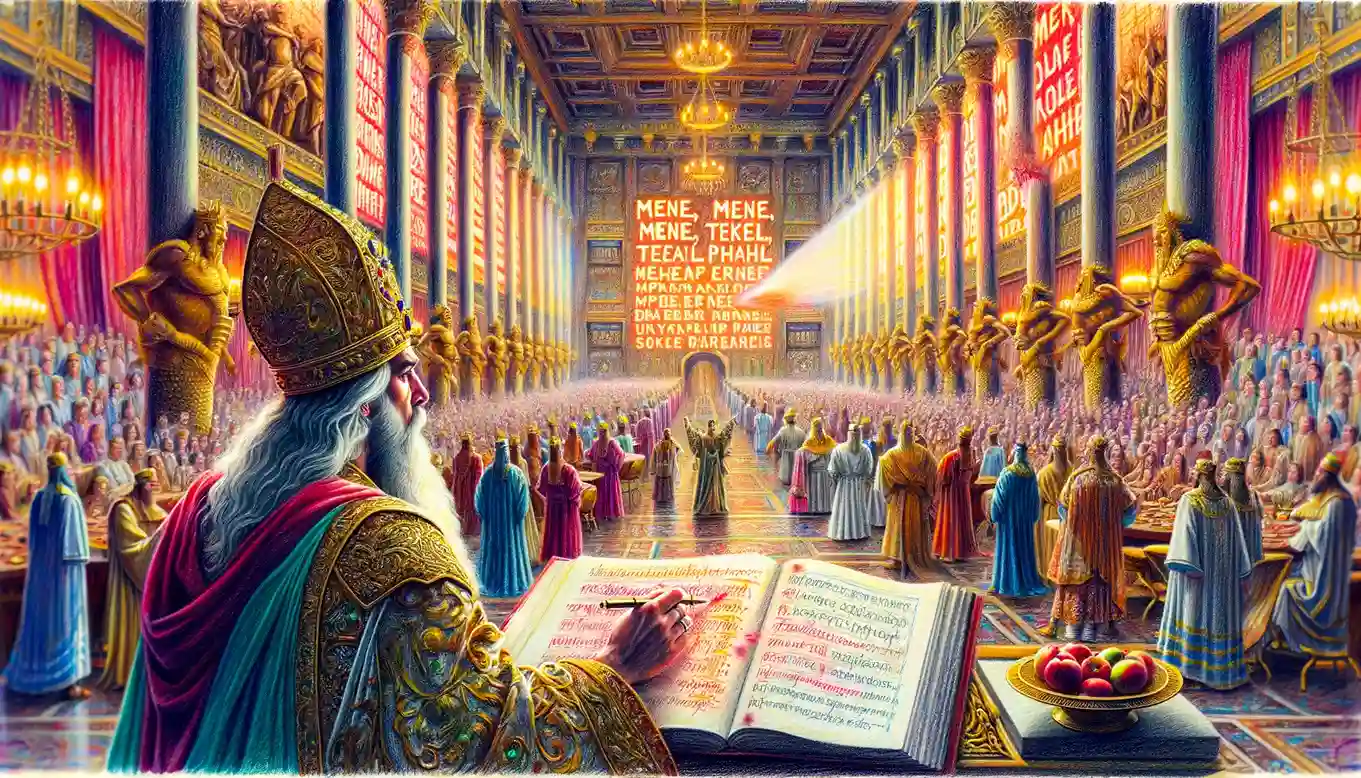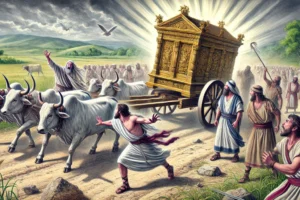
The Writing on the Wall: Belshazzar’s Feast in Daniel 5
During a grand feast hosted by King Belshazzar, a dramatic event unfolded where a disembodied hand appeared and wrote mysterious words on the palace wall. These words, “Mene, Mene, Tekel, Upharsin,” required interpretation, underscoring the theme of divine judgment and the immediacy of God’s communication.
Quick Facts:
- Historical Context: Occurred during the reign of Belshazzar, the last king of Babylon.
- Setting: A lavish feast where sacred vessels from the Jerusalem temple were desecrated.
- Appearance of the Hand: A disembodied hand wrote on the wall, causing great fear.
- Mysterious Words: The words “Mene, Mene, Tekel, Upharsin” were written in Aramaic.
- Daniel’s Interpretation: Daniel was summoned to interpret the writing.
- Meaning of the Words:
- Mene: God has numbered the days of your kingdom and brought it to an end.
- Tekel: You have been weighed on the scales and found wanting.
- Upharsin/Peres: Your kingdom is divided and given to the Medes and Persians.
- Immediate Fulfillment: That very night, Babylon fell to the Medes and Persians.
- Divine Judgment: The event highlighted the swift and decisive judgment of God.
- Belshazzar’s Fate: Belshazzar was slain, and Darius the Mede took over the kingdom.
- Legacy: This incident serves as a powerful reminder of God’s sovereignty and justice.
Historical Context
The event took place during the reign of King Belshazzar, who ruled Babylon as a co-regent with his father Nabonidus. Belshazzar is often remembered as the last king of Babylon before its conquest by the Medes and Persians. The historical context sets the stage for a dramatic shift in power and the fulfillment of prophetic judgment against Babylon.
Setting of the Feast
Belshazzar’s feast was a lavish and irreverent celebration, marked by the use of sacred vessels looted from the temple in Jerusalem (Daniel 5:1-4). This act of desecration demonstrated profound disrespect for the God of Israel and set the tone for the divine intervention that followed.
Appearance of the Hand
In the midst of the revelry, a mysterious and terrifying sight appeared: a disembodied hand began writing on the plaster of the palace wall. The king and his guests were struck with fear, and Belshazzar’s demeanor changed dramatically from arrogance to terror (Daniel 5:5-6).
Mysterious Words
The words “Mene, Mene, Tekel, Upharsin” were written in Aramaic, the administrative language of the Babylonian Empire. Despite being written in a known language, their cryptic nature required divine interpretation. The repetition of “Mene” emphasized the certainty and imminence of the message.
Summoning Daniel
Unable to understand the writing, Belshazzar called for his wise men, who failed to interpret the message. The queen mother then suggested summoning Daniel, known for his wisdom and ability to interpret dreams and signs (Daniel 5:10-12). Daniel, who had served under Nebuchadnezzar, was brought before the king.
Interpretation by Daniel
Daniel interpreted the writing as follows:
- Mene: “God has numbered the days of your kingdom and brought it to an end.” This indicated that Babylon’s time was up.
- Tekel: “You have been weighed on the scales and found wanting.” This signified that Belshazzar’s reign lacked righteousness and was deficient.
- Upharsin/Peres: “Your kingdom is divided and given to the Medes and Persians.” This foretold the immediate division and conquest of Babylon (Daniel 5:26-28).
Immediate Fulfillment
That very night, the prophecy was fulfilled. The Persian army, led by Darius the Mede, captured Babylon. Belshazzar was slain, marking the end of the Babylonian Empire and the rise of the Medo-Persian Empire (Daniel 5:30-31).
Divine Judgment
The writing on the wall served as a clear demonstration of God’s sovereignty and the swift execution of His judgment. Belshazzar’s blasphemy and arrogance were met with immediate divine retribution, reinforcing the theme that God’s justice is both certain and timely.
Belshazzar’s Fate
Belshazzar’s fate was sealed the moment the writing appeared. His death and the fall of Babylon underscored the transient nature of earthly power and the ultimate authority of God over all kingdoms.
Legacy and Theological Significance
The story of the writing on the wall remains a powerful reminder of God’s control over history and His ability to judge nations and rulers. It highlights the themes of accountability, divine justice, and the impermanence of human power. For believers, it serves as an exhortation to live righteously and remain mindful of God’s sovereign will.
In conclusion, the dramatic event of the writing on the wall at Belshazzar’s feast is a vivid illustration of divine judgment and the fulfillment of prophecy. Daniel’s role as the interpreter of God’s message reaffirms the importance of wisdom and faithfulness in serving God’s purposes.



